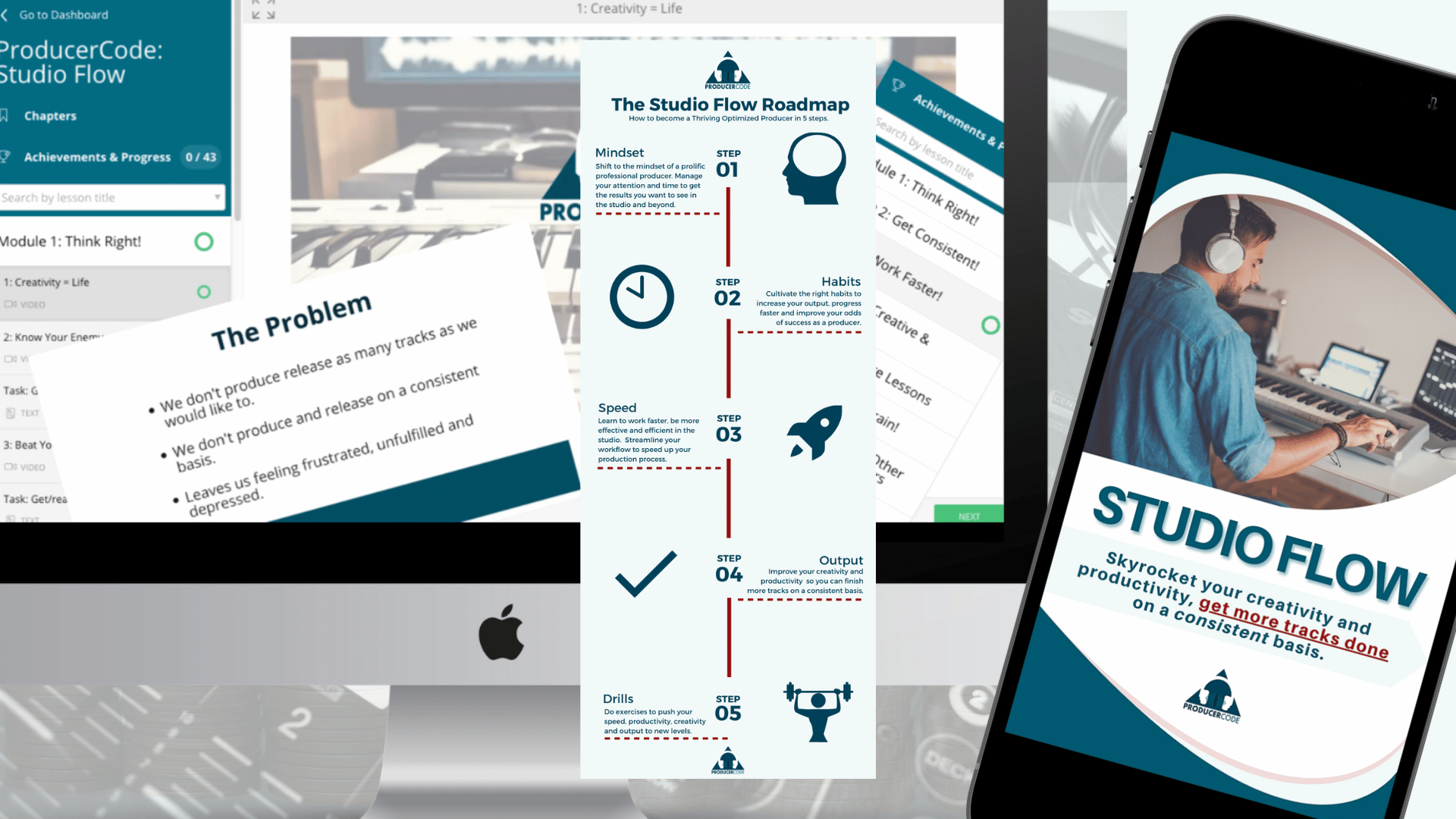25-step music production process checklist and video workshop >>>
Getting Stuck in the Music Production Process? Can’t Finish Beats? Here’s 5 Reasons Why and How to Get Yourself Unstuck, Without Spinning Your Wheels!

Fact: Even the best producers sometimes get stuck in the music production process.
In this post we take a look at why we sometimes hit roadblocks in the studio and how to get things moving again so we can finish more tracks, faster and on a consistent basis.
Why do producers tend to get stuck in the music production process?
There's a huge variety of reasons why producers like you and me tend to hit roadblocks with our music projects, as you can probably imagine. Many of these reasons are very specific to the individual producer.
Below we take a look at some of the common reasons many producers often get stuck and you'll also discover some handy tips and strategies to rise above the stuckness.
5 Reasons Producers Get Stuck While Making Music:
1. Too focused on the results instead of the process
One reason producers often get stuck in the music
production process is because we are too focused on achieving the final
result of the finished track.
You know when you’ve started a
track, developed it to a listenable point and then compare it to a
commercially released track. Ouch! It’s hard not to get demotivated
when you realize the huuuuuuuge gap between where your track is at
compared to the finished release.
The problem here is one of
motivation to continue. It’s easy to feel like you suck at music
production and will never be as good as your favorite artists. So, it’s
easy to just get stuck and rather just go watch some Netflix or
Youtube.
So what should you do when you get stuck in the music production process for this reason?
Focus on the process more than the results. Here’s how:
One technique I suggest to my students is to form the habit of always asking “What’s Next?”.
This
question keeps your mind focused on the next step in the music
production process and not the disappointment of not yet having the intended
final result.
You cannot finish a track with a few moves. It
takes thousands upon thousands of tiny moves. That’s why your focus
should only be on what the next move is.
Sure, you’re working
towards the final mix and you keep that in mind. You’ll get there
faster when you keep your immediate attention on the current task at
hand and move on to the next task right after you’re done with it.
So,
always ask “What’s Next?” until the answer is “Nothing!”. At that
point you’ve finished your track and it’s safer to start comparing with
your reference tracks again.
2. Getting bored with the track - the thrill is gone
This is another easy way to get stuck in the music production process.
You
know the deal. You start a track, get a banger of a loop going and
then after a few hours you think the same loop sucks, or that you’ve
messed it up somehow.
What’s happened in this case is that you’ve probably just heard the loop so many times that your brain has adjusted to it.
That’s why the suggestion I give in the Studio Flow course is to practice the “many moves, few listens” method.
You
want to minimize the amount of times you listen to a loop or the whole
track as much as you can during the production process. This way you
keep it as fresh as possible to your ears.
So, decide what the next move is. Zoom in on that section. Make the move. Zoom out and decide what the next move is.
Never. I repeat. Never just have your loop or track playing over and over without doing anything to progress it.
3. Lack of practice of later stages of the music production process
A cool trick I learned from a guitarist, I forget who, is to practice
the end of a new song first and then practice the start of the song.
The
reason this works is because when we learn a new song we tend to start
at the beginning and then stop when we make a mistake. Then we take it
from the top again. So, we get really good at the start and then get
less practice at the end.
The exact same thing happens in the
studio while producing. We get really good at starting tracks and even
making eight bar loops and never finish enough tracks to get better at
the last stages of the process.
So, if you want to avoid getting stuck in the music production process in this way you need to practice finishing tracks.
A little hack I suggest here is to find multi-tracks in your genre and just mix them. Mike Senior has just posted an update of the huge selection over at Sound-on-Sound. You can get the link to the multi-tracks here.
This
way you avoid having to write the music and don’t have to do the
arrangement. You can just practice mixing which is usually the final
stage in the production process. After a while you'll get good at the mixing part of the process which means you'll more easily and quickly move into and finish this stage with your own productions.
If you're really new to music production and still uncertain of all the stages and steps involved then be sure to download your free copy of the workshop and checklist I recently created.
4. Moving too slow
It pays to be a bit aggressive when you’re in the studio. With this I simply mean you want to move as fast as you can.
The
reason you want to do this is because the longer you take to finish the
track the higher the chances that you’ll get bored or stuck in the
process.
Now, it’s easy to fall into this particular trap because
unless you’re working with a client or a label you don’t have a real
deadline for your own tracks. This equates to having no sense of urgency
and no need for speed.
One solution is to create your own sense of urgency using deadlines with real-world results.
You
can, for example, announce a release date on your socials. The threat
of embarrassment can be a good motivator to get it done. Or, you could
tell a few friends you’ll give them each $100 if your track isn’t done
by your deadline date.
Another suggestion which I’ve included in
the Studio Flow course is to start with your broad moves and only do
the smaller tiny moves near the end of the production process.
This
helps you get as much of the track done as fast as possible and then
polish and finesse the mix when the foundation has been laid and all the
main elements are in place.
5. Not noticing workflow bottlenecks
If you often get stuck in the music production process at the same place
then you have a bottleneck in your music production workflow.
This is where you have to get a bit meta with it and change your workflow so you finish your tracks faster.
You
may spend hours on a snare sound when it’s not really needed. You may
wait too long before you start your full arrangement. You may have too
many distractions like Youtube videos and social feed notifications
while working.
This is where it makes sense to review your
system, workflow and music production habits to see if you can unblock
the bottlenecks and streamline your process.
Track what you do
while producing and how much time each task takes you. Then think of
possible ways you can speed up tasks, especially the time-hogs.
In Conclusion:
So, there you have 5 potential reasons for getting stuck in the music production process and some ways you can side-step these issues and get more music done!
Now, if you want to discover a way of getting more tracks done faster and on a consistent basis and dramatically reduce the changes that you'll get stuck in the music production process, then be sure to check out the Studio Flow course while it's still open for enrollment. You’ll learn about the mindset and habits you need to cultivate and the techniques you can implement to become a producer that finishes tracks faster and on a consistent basis.
Until next time…
… get more music done!
Overcome Distractions, Doubts, and Insecurities with Studio Flow's No-Fluff Approach
Focus on increasing your creativity, productivity, and consistency. Studio Flow offers a framework for making a shift to a professional producer mindset.
The course is tailored to meet the specific needs of music producers who struggle with procrastination, lack of motivation, bad habits, distractions, fears, doubts, and insecurities.
Led by professional and personable instructor Marius, Studio Flow offers a no-fluff approach to learning, presenting a roadmap to becoming a thriving, optimized music producer.
So if you're looking to take your music production output to the next level, click the link below right now, to learn more about Studio Flow and get started today!


Learn to understand equalisers and frequencies to supercharge your mixing skills and get results, fast...

New producer? Learn everything you need to produce your first professional track right now...

Would you like to discover the simplest and easiest way to learn music theory as a music producer?
Share this post. Spread the knowledge so other producers can benefit too:
- Renegade Producer
- Music Production
- Stuck Making Music
ⓘ Some pages contain affiliate links so I might earn a commission when you buy through my links. Thanks for your support! Learn more



